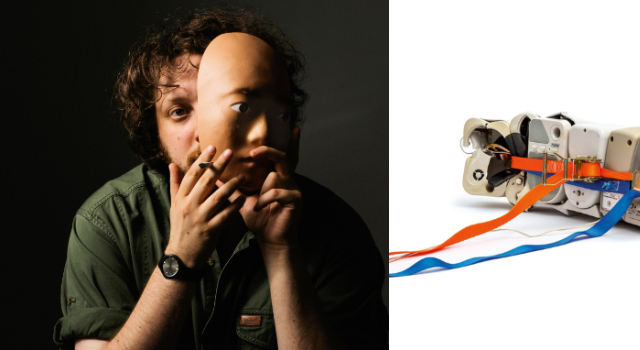Music
Hampshire College's Music Program encourages students to engage in an interdisciplinary process to understand music as a creative expression and its role in culture. Students can take courses in ethnomusicology, popular music, music theory and composition, music journalism, and various area studies courses. Many music courses address the themes of Hampshire’s four Learning Collaboratives (LCs): Media and Technology, Environments and Change, In/Justice, and Time and Narrative.
Through the Five College consortium, students can study Western historical musicology, music technology, and a wide range of theory and performance courses. Students with a particular interest in ethnomusicology — the study of music from a multi-disciplinary perspective — are encouraged to pursue the Five College Certificate in Ethnomusicology
Student Project Titles
- `Soundin' like weself': The Trinidadian Rapso Music Tradition (a radio documentary)
- `Chi e Costei'? The Rise of Women Composers in Italy During The Late 16th and Early 17th Centuries"
- `That Wasn't Me! Cultural Criticism and Ironic Satire in The Personas and Alter Egos of Popular Musicians
- The Mind and Music: An Exploration of Music, Soundscapes, and Pop Culture Through Synthesis and Psychoacoustics
- Process in the Music of John Luther Adams
- Individualism, Community, and Instrument Making in Santa Cruz, California: An Insider's Perspective on Luthiery
- Music as a Rehabilitative Tool for Cochlear Implant Users
- Adapting Buddhist Ritual/Voice Recital
- Maine Fiddle Camp: The New Tradition of American Fiddle Music
- when the night ended, it rained:: the politics & poetics of collective improvisation
- Staging the Voice in the Theatre of Limits: Gender, Vocality, & the Creative Act
- The Resounding Unknowable: Lacanian Perspectives on Sonic Aesthetics
- Kde je Äechy?: The reinvention of Czech musical identity after World War II
- sculptural sounds, auditory spaces
- Analysis of Three Prog-Rock Albums and Their Associated Music Scenes
Sample First-Year Course
Introduction to "Asia" through Performing Arts Traditions
"Asia" is a diverse, dynamic, and complex phenomenon, whose locus and boundaries have been constantly changing in reality as well as in people's imagining. The more you know about its diverse cultures, their histories and expanding global outreach, the more difficult it becomes to nail down what "Asia" really is. This course invites students to explore "Asia" by using its expressive cultures as an entering point, and experience their distinctive aesthetics, sensibilities, cosmologies, and social values as reflected and embodied in their much-adored cultural heritages in music, theatre, and dance as well as in everyday religious and secular practices. Case studies are drawn from South, Southeast, and East Asia with special attention to performing arts's storytelling functions. Through reading and some hands-on practices, students examine how each society and culture in these case studies documented, enacted, negotiated, and rewrote their cultural memories. No previous training in performing arts is necessary.
Writing About Music
In this writing intensive course, students will read and try their hand at different types of music writing, including music journalism, reviews, memoir, and literary non-fiction. Students will learn the art of proposal writing, how to structure an argument, and dive into the processes of editing/revision. Our reading and listening will cover a broad range of music styles, including rock/pop, rap, R&B, jazz, folk/traditional music, and western classical genres. In addition to learning basic music terminology and concepts to strengthen how we communicate about music, we will do "deep listening" with respect to the music itself — lyrics, structure, style, and performance. At the end of the semester, students will choose a piece of music or a song, analyze it musically, structurally, and lyrically, and share their work in a short oral presentation.
Sample Courses at Hampshire
- American Strings: Old Time and Bluegrass
- Appalachian Old Time String Ensemble
- Applied Ethnomusicology
- Early Music Collegium
- Encapsulating Sounds: Introduction to Critical Organology
- How Music Works
- Introduction to Ethnomusicology: Problems and Methods
- Irish Music: Folklore, Performance, and Ethnography
- Listening To Japanese Sound Cultures
- Master Musicians of Africa: West Africa
- Musical Beginnings (introduction to music theory)
- Musical Explorations: Theory, Analysis, and Composition
- Musical Cultures of the Caribbean
- Music of Immigrant America
- Music Journalism: Radio and Podcasting
- Music of Shakespeare’s England
- Presenting the Performing Arts: Documentation and Advocacy
- Round, Chase, and Catch: The Art and Fun of Performing and Writing Canons
- The Power of Black Music
- World Music: A Critical Inquiry
Through the Consortium
- Composition Seminar (Amherst College)
- Experimental Music (Smith College)
- History of Music: 1700-1900 (UMass Amherst)
- History of Music: 1900-Present (UMass Amherst)
- Introduction to Audio Production (Smith College)
- Introduction to the Music of Africa (Mount Holyoke College)
- Jazz Theory and Improvisation (Amherst College)
- Music and Animation (Mount Holyoke College)
- Music and Democracy (Smith College)
- Music and Film (Mount Holyoke College)
- Music and Technology (Mount Holyoke College)
- Music Education (variety of courses) (UMass Amherst)
- Rhythm (Amherst College)
- Sacred Sound (Amherst College)
- Selling Music (Amherst College)
- Seminar on Opera (Amherst College)
- Songwriting Seminar (Smith College)
- Tonal Harmony and Counterpoint (Amherst College)
- Topics in World Music: Popular Music of the Islamic World (Smith College)
Instrumental ensembles and groups at the Five Colleges are open to Hampshire students (some by audition), including Amherst College jazz ensembles, Smith College's Chamber Music program, the UMass Amherst University Orchestra, the Indonesian gamelan, the Chinese music ensemble at Smith College, the West African Drumming Ensemble at Mount Holyoke College, and many others.
Through the Five College Early Music Program, a faculty of distinguished performers and scholars at the Five Colleges, together with the program director, make it possible for students to participate in a wide variety of experiences in the study and performance of music of the Middle Ages, the Renaissance, and the Baroque Era. Students interested in music technology can take courses in sound and recording technology through the Five College consortium.
Students can also take private instrumental and vocal lessons for credit. The Private Lessons Fund helps offset some of the cost of private lessons for Division II and III music concentrators; other funding sources for private lessons are also available.
Facilities and Resources
The Music and Dance Building in the Longsworth Arts Village contains classrooms, practice rooms, a recital hall, and staff/faculty facilities and offices. Other campus resources include the Media Lab at the Harold F. Johnson Library, as well as the Library's collection of books, scores, periodicals, films, videos, and recordings. Extensive music collections from all of the Five College libraries are also available to Hampshire students.
Student-organized bands and music groups in jazz, folk, world music, pop, rock, punk, and a cappella, to name just a few, are active at Hampshire and across the Five College campuses. The larger Five College music community offers hundreds of concerts and musical performances every year, featuring internationally renowned classical, jazz, and world music performers. The Connecticut River Valley (and particularly Northampton) offers many opportunities to hear and play music at numerous local venues and clubs.



